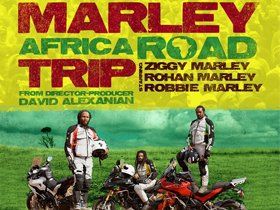During their exploration, they also relate the lessons they have learned from their father about family, moral righteousness and revolution, as well as his dream of a unified Africa, as they work to find out what they themselves have done with their his legacy.
Speaking with Cassandra Rowley for SA Men, Ziggy Marley shed some light on his reasoning behind the trip and how he believes his father's music has in some way influenced African unity.
SA Men: How far do you think Marley Africa Road Trip will go in educating the world about the actual state of affairs in Africa?
Ziggy Marley: I think it will go far, because being my first time in South Africa, even I felt very good about what I saw in South Africa, especially after hearing some skeptical news about the country, and thinking you need to wear a vest for knife attacks because it was so dangerous. So I think it will show Africa in a good light for people who haven't been to South Africa and don't know about it, so I think that it's good for Africa.
SA Men: Why did you choose to do your trip on motorbikes?
Ziggy Marley: You know, all three of us are fans of motorcycles, and the experience of riding a motorcycle is very mental. It's very conscious. You have to be aware. The main thing about doing this trip on a motorcycle was to be open to the elements and to the people. It's a much more open way to travel. The experience is more real when you travel on a motorcycle through a country. Whenever we stopped, we would get involved with the communities where we stopped in, we got to explore places and see people in a different way than if we were in a car.
SA Men: With Bob Marley having had interests in South Africa around the 1980s, do you think he'd be proud of you having been to South Africa and having seen what you have seen?
Ziggy Marley: Yes I think he would have been happy, you know South Africa has come a long way since from when he was concerned about the situation. But I think he'd be concerned about what the next move would be, we've accomplished only part of the goal that has been set by the dreams of many African forefathers, even my own father. The next part of that dream is to see a united Africa in even more of a significant way than what it is today, that would have been the next part of his accomplishment.
SA Men: About the concert that your father performed in 1980 in Zimbabwe, you were much younger at the time, and after performing recently in South Africa, what have you noticed in terms of people's attitudes and responses towards your performance compared to his performance, anything different?
Ziggy Marley: Well I think the people are hungry for music that has a message and uplifts them, because today's society, the music is much less about ideas, the music industry is much more frivolous, I guess the word is commercialized. So people seem to be hungry for our music. They need this music and its message. There has been a big generation change since that time, where the younger generation today is less concerned. According to my experience, I'd say that the generation today is so separated from the struggle that their concerns are much different today. There is such a gap between the struggle and this new generation. So when we played in South Africa, it filled that gap. The people today still need a message.
SA Men: What is the most important thing to you personally, about Africa?
Ziggy Marley: You know being in South Africa, and being in Africa, is a very spiritual experience for me. Africa is a land that is rich in spirit, rich in vibrations, rich in energy. It's a very ancient land, and I feel a very strong connection to its vibrations and energy. To look on the land of Africa, is almost to look on the history of the Earth, the history of the world, because Africa is where the world began. It is where man began. So I miss being on that land where mankind started from, because there is some connection there that is not felt anywhere else in the world, and that is what I miss.













 less
less
 more
more